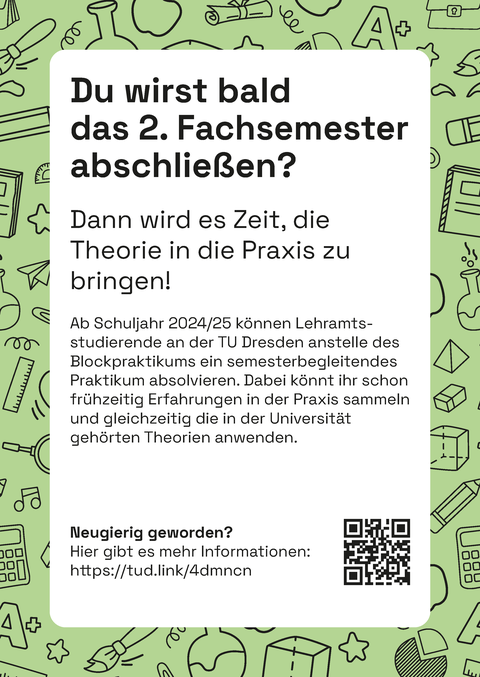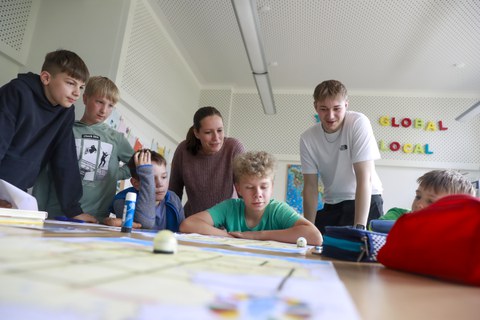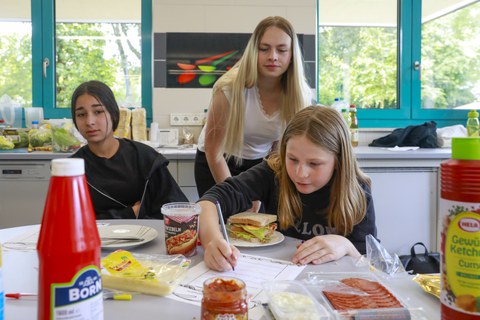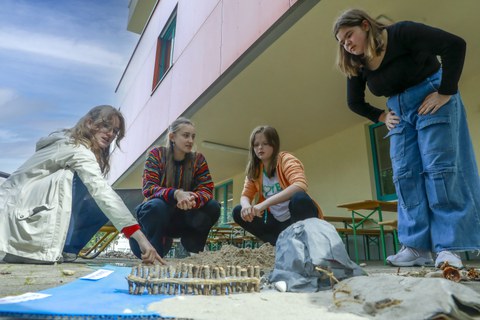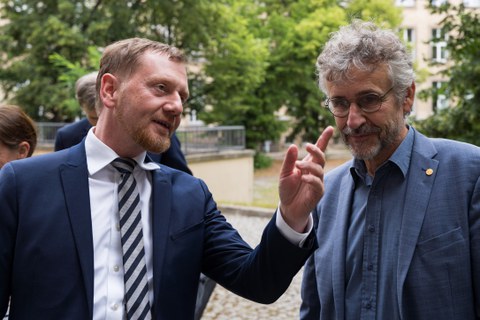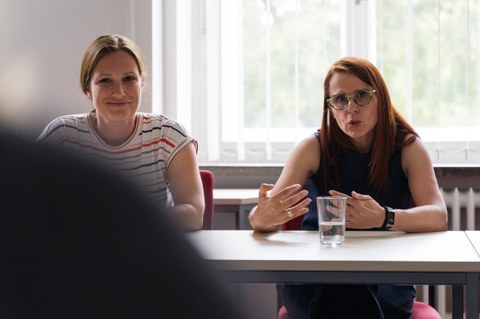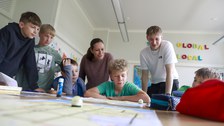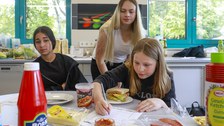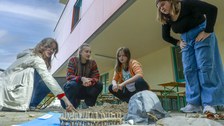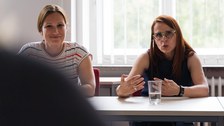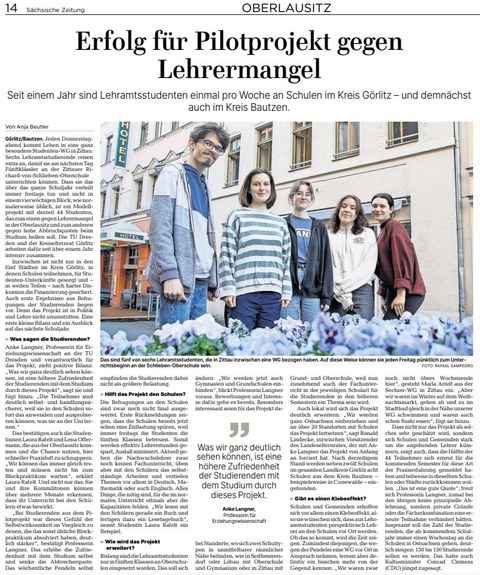Alternative internship at selected schools in Eastern Saxony
On this page, you will find general information about ALSO, the semester-long school internship. Follow the links for up-to-date news, information for students, media coverage, and publications.
Table of contents
- "Growing into school" - gaining practical experience continuously and purposefully
- Up-to-date: New in the 2025/26 school year
- First successes are visible - Pilot project to combat teacher shortage is growing
- The semester-accompanying internship - devleoped at University School Dresden
- Sponsoring organisations
- Media inquiries
"Growing into school" - gaining practical experience continuously and purposefully
Marla will be part of the pilot project in East Saxony in the 2024/25 academic year. In the video, she talks about her experiences from the 1st pilot phase. © TU Dresden
From the start of the 2024/25 school year, teacher training students at TU Dresden will be able to gain continuous practical experience at an early stage and learn to reflect on this and combine it with theory. This is made possible by a modified internship format and close cooperation between TU Dresden and the internship schools - even in higher semesters.
How the internship used to be:
Studying to become a teacher primarily means getting to know theories and research practices at the university. You then have to transfer this knowledge into your own practice or formally translate it into practice. The first format in which you do this is the block placement A.
In preparation for this block internship, you will attend an introductory course in July/August, where you will be instructed primarily in school law matters and the requirements for the internship report will be discussed. You then go to the placement school for 100 hours in September and ideally you will be accompanied by a mentor at the school. What this support looks like depends entirely on the circumstances at the school and the mentor in question. After your internship, you will attend an evaluation event in October. At this late stage, there is often no time to revisit the situations you have experienced, as you have already left the placement school and the internship behind you. The only thing missing is the internship report, for which you will receive recommendations. By the time you have handed this in at the latest, the internship is a thing of the past for you.
In this format, you have to manage to transfer the theories you have heard at university into your pedagogical practice in a meaningful way mostly by yourself. This is not easy, some students despair, but this should now change:
How it is possible:
During your studies, you will systematically be given weekly opportunities to gain practical experience, to reflect on this continuously and, above all, to combine it with the theory you have heard in seminars. With these weekly experiences, you yourself can enrich the seminars and lectures at the university, because the continuous practice puts you in a position to question theories and models on the basis of your own experiences. You also have the opportunity to discuss these thoughts together with the project leaders.
You can find out what tasks you will take on during your internship and what support you will receive in the FAQ - Questions and answers for interested students.
Up-to-date: New in the 2025/26 school year
Onboarding for student teachers begins at schools in the Saxony region
In the 2025/26 school year, around 100 students from TU Dresden will complete a semester-long teaching internship. After the fall break, they will start at 16 schools in East Saxony, in the Saxon Switzerland/Osterzgebirge district, and in the Erzgebirge district. Preparations began in September with seminars at TU Dresden and on-site visits. Together with the project managers, they visited their assigned schools. The future teachers got to know each other in their future teams of four and their colleagues. Many local authorities welcomed the students to their town halls and gave them a tour of the city, showing them not only the participating schools and the shared apartments provided for the internship, but also the advantages of schools in rural areas.
New for the 2025/26 school year are 12 extra schools in rural areas, as well as Wednesday and Thursday as additional internship days. These complement Friday, which remains an internship day. For students, the choice of more municipalities, schools, and weekdays means greater flexibility and makes it easier to integrate the teaching internship into their everyday student life.
Students accompany pupils: Project to combat teacher shortage in Saxony to be expanded
mdr Sachsen, October 15, 2025
Following positive experiences in Görlitz and Bautzen, the “alternative teaching internship” (ALSO) will be expanded to other schools after the fall break. This was decided by the Saxon cabinet, as announced by the Ministry of Education and Cultural Affairs. In addition to other secondary schools in eastern Saxony, students will then also be able to gain practical experience in the districts of the Ore Mountains and Saxon Switzerland/Eastern Ore Mountains.
Teaching internship to be expanded: Students to assist at more secondary schools
Sächsische Zeitung, October 16, 2025
Measures to address teacher shortage in rural areas: Saxony wants to attract more teachers to schools in rural areas. With a new form of internship, prospective teachers can gain practical experience at secondary schools on a regular basis while still studying at TU Dresden. Saxony is now expanding the successful model project from Upper Lusatia to other secondary schools in rural areas. This has been decided by the cabinet.
Further reports can be found in the ALSO media review.
First successes are visible - Pilot project to combat teacher shortage is growing
Sächsische Zeitung Görlitz, 02.06.2025
The teacher project has already been running for several months at secondary schools in the district of Görlitz. Now the district of Bautzen and other types of schools are joining in. Initial findings on the success of the project to date are now available.
Summary from the SZ newsletter 5in5 Löbau/Zittau, June 2, 2025
- What has happened: For more than a year, there has been a pilot project to combat the shortage of teachers at five secondary schools in the district of Görlitz. Teacher training students from TU Dresden visit the schools every Friday to teach fifth graders. This benefits the schools and gives the students a chance to gain practical experience more quickly. This project is now being expanded.
- Why it is important: Because many teacher training students want to take up positions in large cities after completing their studies, the teaching situation in rural schools is doubly precarious. The project aims to provide greater support to these schools in particular and also to enable students to gain practical experience earlier and more effectively. This should reduce the dropout rate.
- What happens next: Initial assessments and surveys show that the project is working well. That is why the state has now given the green light for at least 20 schools in the districts of Görlitz and Bautzen to participate from the coming school year – and for up to 150 students instead of 44.
The semester-accompanying internship - devleoped at University School Dresden
The pilot project in East Saxony benefits from the experience that students have already gained at Dresden University School during their semester-long internship. Together with the students and the school community, the academic director of the school experiment, Prof. Anke Langner, is developing the format further.
© TU Dresden
Julian Fischer is studying to become a teacher at TU Dresden and completed his block internship A at Dresden University School. He reports on his experience in the film "Auf Arbeit mit ... Pia Heyne" (see video box on the left, from minute 5:36).
After his teaching internship, Julian Fischer remained at the school as a student teaching assistant at various levels in languages and social sciences. For the #TeamUnischuleTUD interview series, he summarizes his most important experiences from the internship: "At Dresden University School, you can experience how a learning environment works that is geared towards children in a contemporary way. You work at eye level with the pupils and are closer to the individual. This requires a high degree of flexibility and creativity because you have to cater to so many different needs, speeds and levels."
Interested in a school internship at Dresden University School? You can find more information in the news #TeamUnischuleTUD: Breaking new ground while still studying that is meaningful, relevant to life and suitable for children. You can also contact us by email at regardless of current application deadlines. The team at Dresden University School is looking forward to receiving your applications!
About the University School Dresden
Dresden University School is a joint project of the state capital Dresden and the TUD Dresden University of Technology. It is a public and free community school run by the city, where innovative forms of teaching and learning are tested under academic supervision. In addition, it is a training school for future teachers and, in the future, a further education school for teachers. The school trial is being scientifically supported by the ForUS research center at TU Dresden.
- Information on the research project at TU Dresden: https: //tu-dresden.de/gsw/unischule
- Information on the Dresden University School: http://universitaetsschule.org
You can find insights into everyday school life and the research project on various social media channels under @unischuleTUD: Facebook, Instagram, YouTube and LinkedIn. News from the University School Dresden project can be found regularly in the GSW newsletter.
Sponsoring organisations
The first pilot phase was made possible by the financial support of the German Center for Astrophysics (DZA) in Görlitz. The second phase is funded by the Center for Advanced Systems Understanding CASUS, which is also based in Görlitz and is an institute of the Helmholtz-Zentrum Dresden-Rossendorf. In addition, the project is being co-financed by tax funds on the basis of the budget approved by the Saxon State Parliament (SMK) and receives funding from the TÜV SÜD Stiftung. The local authorities support the utilization of the students and therefore encourage the student teams to prepare their classes the night before so to facilitate a smooth start to the learning day with the pupils.
Media inquiries
Please direct any inquiries regarding ALSO to:
Maria Neuland Agüero.
Tel.: +49 173 260 9451







